Abstract
This article presents recent research on digital skills in preschoolers, European educational policies presented in the Erasmus + program, the contents of the within the integrated activities of preschool education, products and results obtained in the implementation of the strategic cooperation project, action 2 (KA2): “Building learning education new digital - BLEND” implemented in 36 months (2017-2020). We will address this topic through research on digital skills in preschoolers, through the specifics of Romanian preschool education, and through the European education and training program of the European Commission (2017), Erasmus +. The development of digital skills for the new generations is a stringent goal in the development plans of European educational institutions because it is not enough to be a digital native, it is important to develop your digital skills according to the five areas that correspond to the description: skills related to information and data, communication and collaboration, creating digital content, safety, problem-solving. The cooperation project “Building learning education new digital - BLEND” was implemented in the kindergarten of Vocational School “Tiberiu Morariu” Salva, Bistrita-Nasaud, Romania for 36 months (2017-2020), in collaboration with five educational institutions from France, the UK, Italy, and Spain.
Keywords: Ambasador Erasmus, digital skills, Erasmus+, educational projects, kindergarten, preschool
Introduction
From the earliest years of life, today's children interact with various technological devices, spending more and more time on the Internet compared to previous generations. Named by most studies, “digital native” children are increasingly exposed to technology, and the Covid-19 period amplified this phenomenon. Today's children are the ones who will have professions in adulthood in which digital skills will count for 90% and our role as educators is to prepare them for the acquisitions in the STEAM area from kindergarten, STEAM (Science, Technology, Engineering, Arts and Mathematics). The situation in Romania is as a paradox, the digital skills of the entire population are low, and we are in the 28th place of 28 states reviewed, in a country known for a successful IT industry a high-speed internet. The development of digital skills for the new generations is a stringent goal in the development plans of European educational institutions because it is not enough to be a digital native, it is important to develop your digital skills according to the five areas that correspond to the description: skills related to information and data, communication and collaboration, creating digital content, safety, problem-solving.
The objective of this article is to describe the potential of the Erasmus+ Cooperation project “Building learning education new digital - BLEND” in developing digital skills in preschool-aged by presenting the activities implemented, analyzing the products achieved, and by presenting these results. The cooperation project “Building learning education new digital - BLEND” was implemented in the kindergarten of Vocational School “Tiberiu Morariu” Salva, Bistrita-Nasaud, Romania for 36 months (2017-2020), in collaboration with five educational institutions from France, the UK, Italy, and Spain. The cooperation project “Blending learning new digital - BLEND” was winning 5 Quality certificates.
Problem Statement
(Bocoș et al., 2016a) define the ability as: “The acquired ability of the individual to perform an activity that involves skill, understanding, dexterity, precision, finesse and it’s formed by practice and developed by the complex action of several factors, of which intelligence has a primary role” (p. 16).
(Baciu et al., 2022a) define digital skills:
Mental or physical ability to use digital devices, communication applications and computer networks to access and organize information. Basic digital skills refer to the basic skills needed to use digital devices and online applications. The advanced spectrum of digital skills encompasses skills that enable users to use digital technologies in transformative, innovative ways. (p. 11)
The Curriculum for Early Education (2019) specifies: “digital skills are not directly targeted by the curriculum for early education but it is recommended that to the extent that available resources allow them to be addressed through the conduct of activities” (p. 15).
(Bocoș et al., 2016c) define preschool as:
Child aged 3-6 years, attending kindergarten, not yet having reached the age required enter in school (by reference to the legislation and to the structure of the education system in Romania). The preschool has specific characteristics of physical, intellectual and psycho-social development, which are made up of landmarks of the teaching activity in kindergartens for children. (p. 137)
(Bocoș et al., 2016b) define the program as:
In a broad sense, with reference to the organization of educational activities at different levels) a systemic succession of educational activities, which are carried out in a predetermined order, with a view to achieving educational ends, often on the basis of a plan, valued as a projective anticipatory mental tool or as a written document. (p. 178)
(Răduț-Taciu et al., 2015) define the Erasmus+ program, as:
The most important vocational, education and training program in the European Union, in terms of mobility and cooperation." The aim of this program is to support the efforts of the partner countries of the European Union, the countries associated to this program, to make effective use of Europe's human talent and social capital on lifelong learning, coupled with support for formal, non-formal and informal learning in the fields of education, vocational training and youth (p. 308)
Erasmus+ Candidate guide (2017) defines priority, digital skills, as:
Open and innovative practices in a digital age: priority will be given to actions that support methods and pedagogies innovative, participatory governance where appropriate, which develops learning materials and tools such as and actions to support the effective use of information and communication technologies (ICT) in the field of education, training and youth. This includes supporting synergies with research and innovation activities and promoting new technologies as drivers of improvements in education, training and youth policies. (p. 132)
Same document defines priority, preschool education, p. 132 as:
Supporting efforts to improve access to high-quality pre-school education and care (ECEC) with reasonable costs. Improving the quality of ECEC systems and provisions to support appropriate child development in order to achieve better learning outcomes and to ensure a successful start in education for all – in especially by improving the EU's ECEC quality framework and ensuring that the benefits of pre-school education are maintained at other levels of school education and in projects that develop new models of implementation, governance and funding for ECEC. (p. 131)
(Bocoș et al., 2016c) define the project as:
Temporary concern for creating a product or offering a unique service, which involves carrying out a system of activities, planned, organized, articulated in such a way as to achieve certain objectives, within a well-defined period of time, with the use of the allocated resources. (p. 197)
The Curriculum for Early Education (2019) defines as:
Educational projects and programs (local, county, national, international), to which the educational unit or the teaching staff has joined, contain sets of actions planned for a fixed duration of time, leading in the long term to the formation of key competences. Since these must be done in a logical sequence, their planning will take into account the correlation with other activities carried out with children and the avoidance of overloading. It is recommended that each teacher carry out activities in at least one national or county educational program/project, specific to the preschool level, depending on the identified opportunities. (p. 12)
Preschools institutions and schools where kindergarten groups are integrated implement Erasmus + cooperation projects, key action 2 (KA2) because these strategic partnership projects have a visible contribution to the development of digital skills in pre-schoolers through integrated and collaborative activities based on information and data management, communication and collaboration skills, digital content creation, internet security and problem-solving.
Taking into account the current meanings of the concepts about digital skills and the Erasmus + program for pre-schoolers, group activities represents a new modern learning design contributing to the efficiency of the teaching act and bringing European visibility to the teacher's activity. The definitions formulated by educational researchers and specialists in educational sciences, through the range of accents they put in the foreground, support the teacher in selecting the most appropriate activities for the development of digital skills in pre-schoolers, depending on their age, the predominant type of intelligence and own learning style. In our opinion, the integrated and collaborative activities carried out within the strategic partnerships such as Ka2 under the umbrella of the European Commission program, Erasmus + are activities that contributed to children in kindergarten to develop digital skills.
Research Questions
Developing digital skills in pre-schoolers
In this article, the following questions were explored:
What digital tools were effective in developing digital skills in pre-schoolers?
What digital skills have been developed due to the implementation of the Erasmus+ cooperation project:” Building learning education new digital - BLEND” at pre-schoolers from the Vocational School "Tiberiu Morariu” Salva, Romania and from other partner schools?
Which activities were most enjoyable for pre-schoolers?
Research Methods
The research methods used in the Erasmus + strategic partnership project, “Building learning education new digital - BLEND " with no.: 2017-1-FR01-KA219-037364_6, carried out over a period of 36 months, (2017-2020) were the observation, the analysis of the products of the activities carried out by the preschool children and a survey based on the questionnaire applied to preschool teachers. The project involved 150 preschoolers aged between 3-6 years from partner kindergartens: Ecole Simon Bolivar A Paris, France, Ecole Simon Bolivar B Paris, France, CEIP San Jacinto Sevilla, Spain, St. Austin’s Primary School Liverpool, U.K, I.C Francesco Petrarca Catania, Italy, Vocational School”Tiberiu Morariu” Salva, Romania guided by 15 teachers. In the application of research methods, collection of data, and interpretation, we observed changes in developing digital skills, collaboration in the work of transnational mixed teams, and the improvement of foreign languages.
Findings
The strategic partnership Ka2, “Building learning education new digital - BLEND” was implemented in partnership with five kindergartens taking into account the European priorities of the Erasmus+ program on increasing the quality of preschool education and developing digital skills for pre-schoolers. The life cycle of the project began on 1.09.2017 and ended on 31.08.2020. The project started with the creation of secure virtual space for pre-schoolers and teachers, Twinspace (Blending learning new digital-BLEND) in the eTwinning portal, the platform offered by the European Commission for the development of digital skills of pre-schoolers and teachers. The activities included content from the six curriculum integration themes of the Curriculum for Early Education (2019): “Who am I/are we?, When, how and why is it happening?, How is it, has it been and will it be here on earth?, Who and how does it plan/organize an activity?, How do we express what we feel?, What and how do I want to be?” recommendations were included in the integrated activities depending on the digital resources used, the interactive teaching aids, the applications used.
The activities involved teamwork and collaboration among pre-schoolers, visible in the digital products obtained in the project. Using Lego Education We Do 2.0 kits in the project contributed to the development of information and data skills in the field of robotics and coding. Activity for creation of small robots from Lego parts to which electric hubs with batteries were attached to move these small robots. The Lego Education We Do 2.0 robotics kit (Figure 1) has helped to develop the ability to use information from tablet applications and develop data skills by combining Lego pieces in various forms. The partner teams randomly drew a theme by chance and the pre-schoolers guided by the teachers made those robots that have been involved in various learning tasks depending on the topics in the curricula of the European kindergartens involved: robots that clean in the cities, robots that feed farm animals, robots that move on the planet Mars, robots that build, etc.
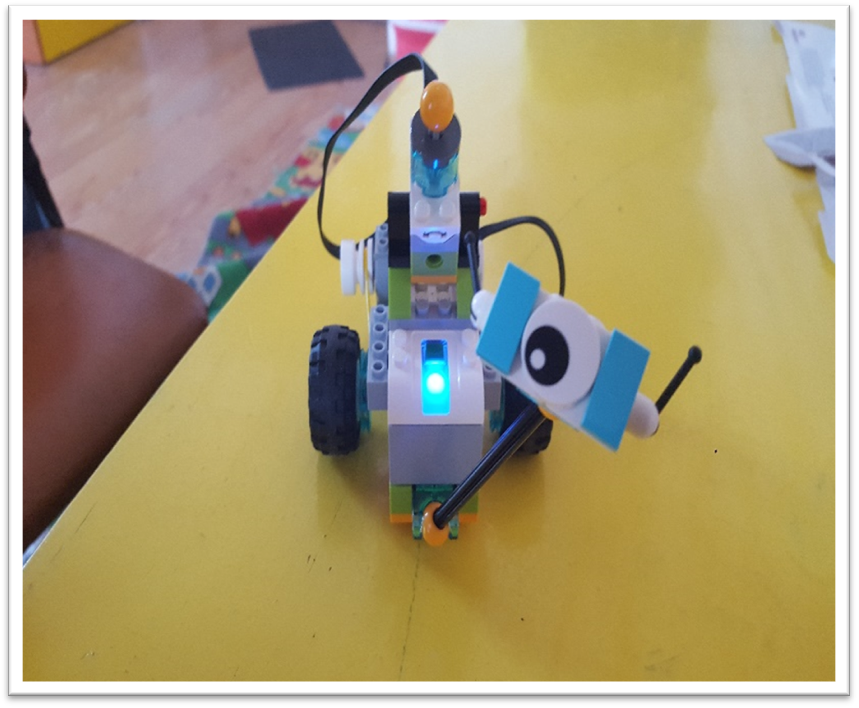
A challenge for us, participating teachers was to find the most suitable activities adapted to preschool age to develop the ability of digital security. The activities carried out on the eTwinning platform, in the Twinspace collaborative learning space, contributed to the development of this skill during the implementation of the project. Marking every year Safe Day (Figure 2), Code Week days, the organization of exhibitions of plastic works on the topic of Internet security, the digital games provided by the European Commission (2017), the discussions with the parents regarding the psychologists' recommendations regarding the time spent in front of the devices, recommendations for parents regarding the safety of children on the boarding school were some of the activities carried out to develop this skill and to make pre-schoolers aware of the dangers of the virtual world.
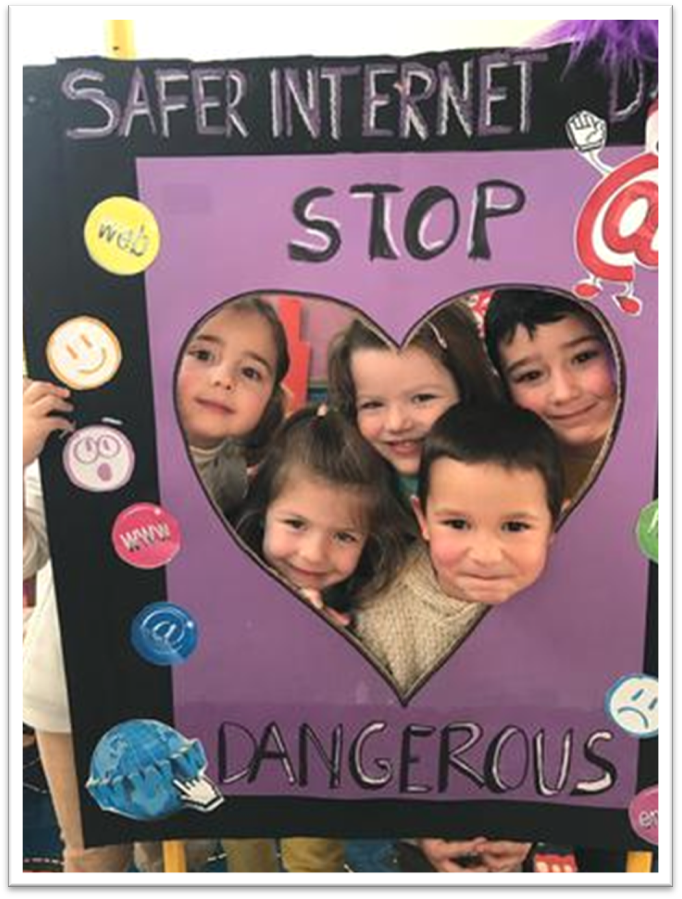
During the activities, we developed collaboration and communication between students, teachers, parents, and other specialists, so at the proposal of the Spanish team that proposed marking the 500th anniversary of the journey of Magellan / Juan Sebastian del Cano, we made a digital journey around the world of a national explorer. The Romanian team selected Dumitru Dan (Figure 3), who explored most countries of the world on foot on the eve of the First World War. With the help of an ozo-bot, a mascot representing a young man dressed in a folk costume and markers, we retraced the route of the explorer, making a video with the necessary explanations .The activity was completed by creating an educational film, an innovation for the preschool level comprising aspects of digital travels carried out in Romania, Spain, U.K, Italy and France, using digital applications such as Windows Movie maker, YouTube, Ozobot, which was subtitled by teachers in English and upload in Twinspace of project and European Erasmus+ data results platform.
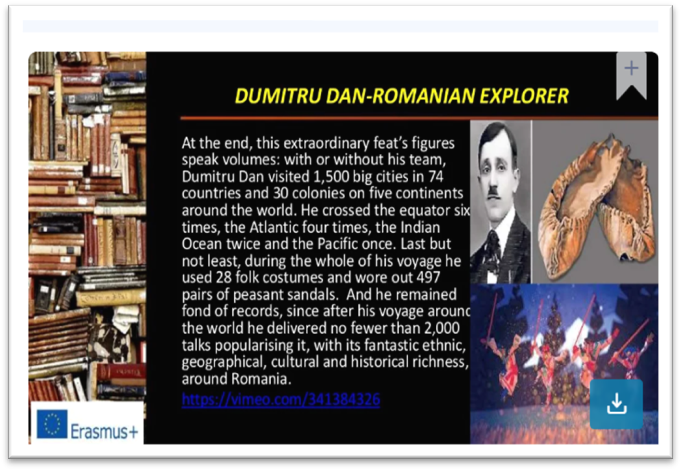
The digital content creation activities focused on the principle from simple to complex and made full use of Google Voice applications, jigsaw planet, learning apps, the presence of tablets, an interactive board and a system that contributed to the development of digital skills. A related task was the creation of easy-to-read graphic content by pre-schoolers, using images and symbols for European preschool children, consolidating, digital skills, also in virtual format by using the www.worldwall.com, www.jinsawplanet.com (Figure 4) ; European pre-schoolers shared their digital content elements created, these were used in the activities, presented as examples of good practice, uploaded to the European Commission's (2017) open resource platforms for use by all concerned.
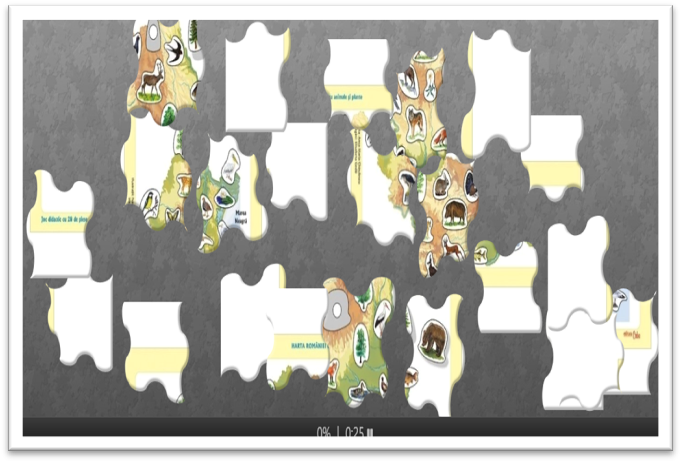
The final product of the project is a collaborative magazine: “Blend magazine”, an e-book created with the help of the Book-Creator application (Figure 5). Pre-schoolers from partner countries drew and made art-crafts with Safe Net theme, coding and robotic theme making the illustrative part of the book. Preschool children have developed their creativity and ability to communicate with the teachers, parents, and other invited specialists in the project. The participating preschool teachers improved their methods of teaching digital content, improved IT skills and foreign language skills.( Blending learning new digital - BLEND” Erasmus+ project: the collaborative e-magazine)
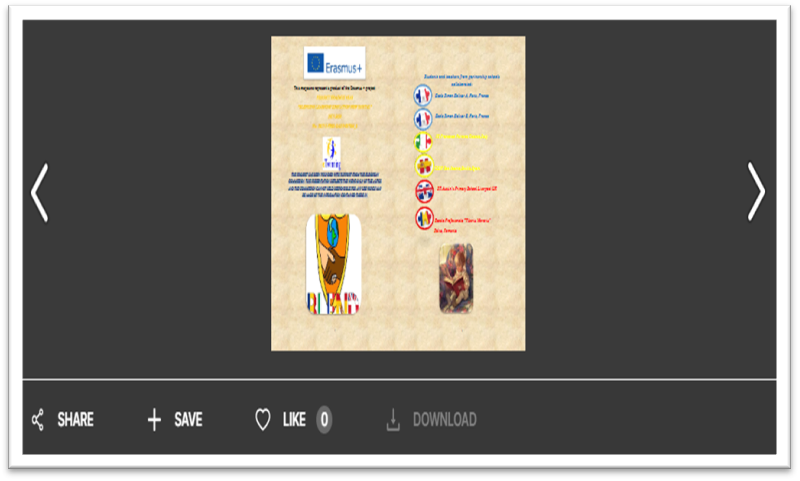
At the end of the project, the 15 preschool teachers from European kindergartens (France, Spain, the U.K, Italy, and Romania) answered three questions in a survey based on a questionnaire, initiated by the Romanian team, by selecting the digital tools that have been used most often in the group work during the implementation of the cooperation project, Erasmus+ “Building learning education new digital - BLEND " to develop digital skills. The most digital tools used with pre-schoolers were Lego kits, tablets, bee-bots, interactive boards, and smartphones (Figure 6).
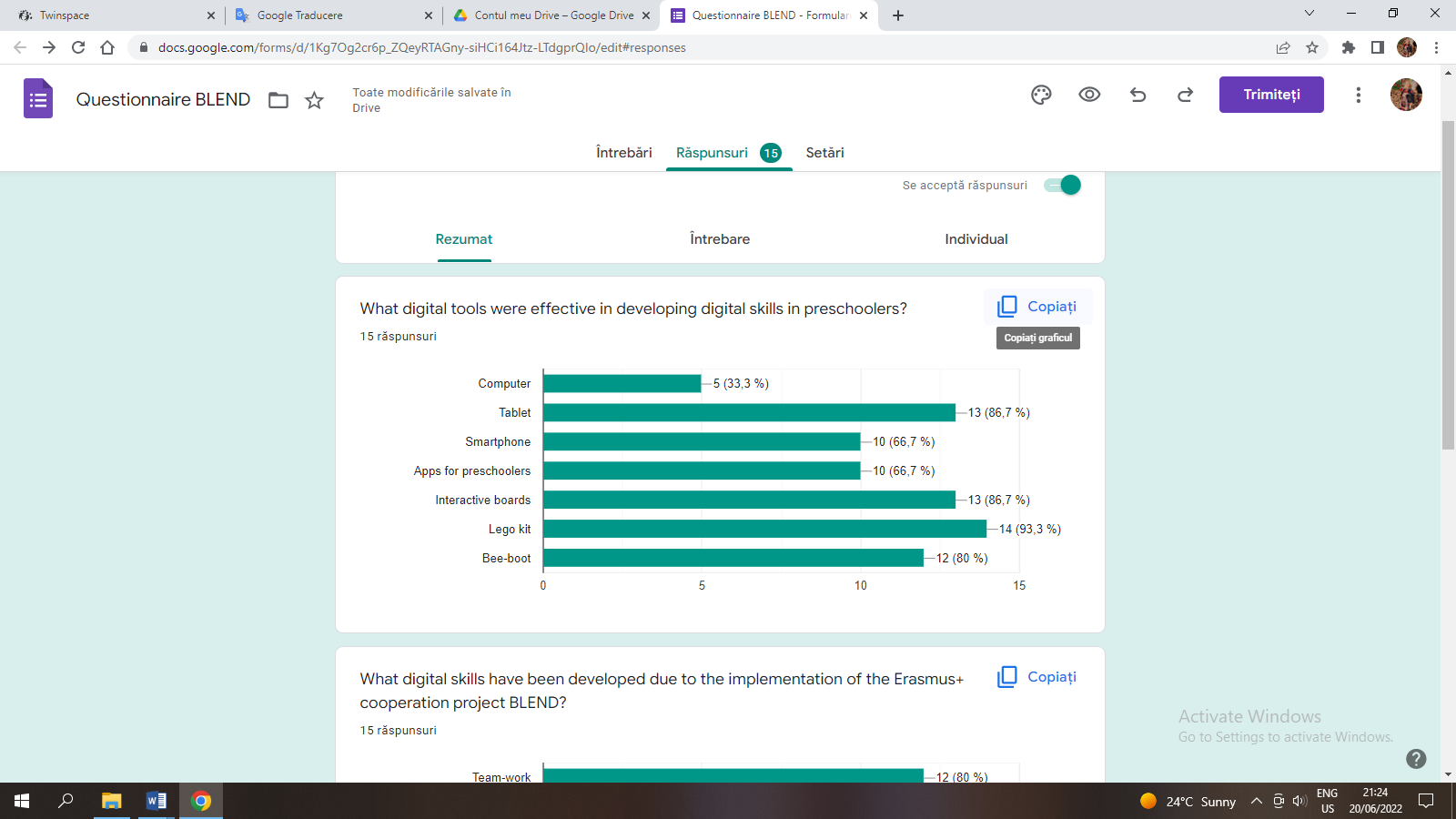
European teachers participating in the cooperation project, Erasmus+ “Building learning education new digital - BLEND” following the observation of the activity of preschool children, the analysis of digital portfolios, the oral questioning of preschool children, discussions with the parents of the preschool children, evaluation of foreign partners in international mobility, they identified digital skills developed following the implementation of the project. The first places in this survey are communication skills, robots, and coding skills, creativity, problem-solving and teamwork developed during the project implementation (Figure 7).
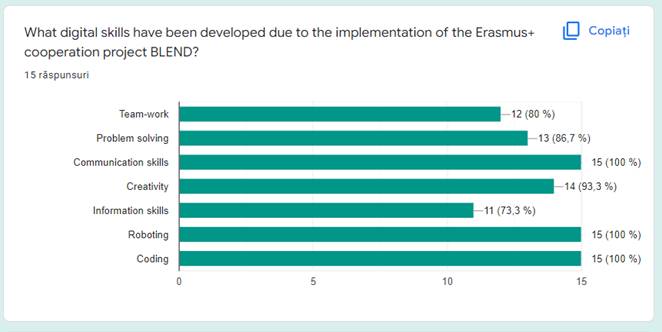
The teachers participating in the strategic partnership, Erasmus+ " Building learning education new digital - BLEND” asked the preschool children orally about the activities carried out, voting at the group level the one they liked the most. Leading positions in this survey are Logo Boost activities, Lego Education We do 2.0 activities, Bee-boots activities, and Digital games (Figure 8).
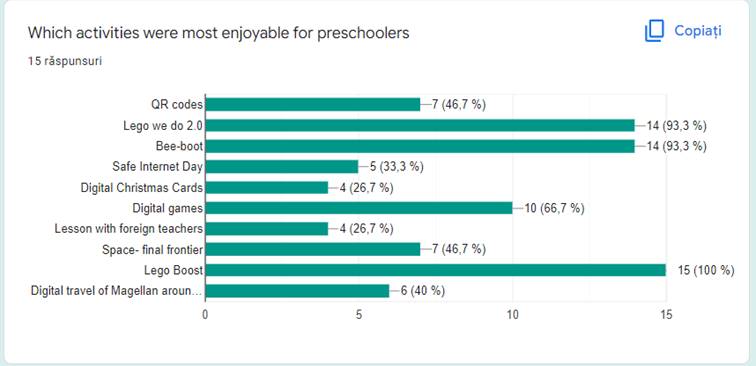
An important activity of the project was the validation and verification of digital content by Romanian pre-schoolers created by preschool children from partner countries (France, Spain, the U.K, Italy), also the self-assessment of their own activity in digital portfolios, own products made verbally, through drawings, through digital evaluation applications. The development of digital skills in the project for pre-schoolers was beneficial during the pandemic because the transition from face-to-face learning to virtual or hybrid format was easy and the materials purchased in the project were fully used by pre-schoolers, their families, and teachers. During the pandemic period in collaboration with the Bistrita-Nasaud County School Inspectorate and the Bistrita-Nasaud Teaching Staff House we conducted webinars to present the products obtained within the project that we made available to educators and pre-schoolers in the county, we conducted testimonials on the use of applications that can deliver digital content to pre-schoolers.
We have taken care throughout the project implementation to comply with the GDPR rules, obtain the consent of parents and guardians, and comply with the laws in force regarding digital materials uploaded to the platforms used and on social networks: (https://twinspace.etwinning.net/50497)
Conclusions
The activities realized in the Erasmus+ cooperation project “Building learning education new digital - BLEND” has had a considerable impact on pre-schoolers in our kindergarten because they were exposed to various digital activities, using digital strategies, the questioning contributes greatly to the increase of digital skills. During the implementation of the project, preschool children had the chance to use information and data content, operate with codes, create robots, develop skills related to Internet security, create digital content, practice language skills, operate on interactive whiteboards, operate applications on the tablet, communicate effectively, collaborate, ask questions, to work as a team. The didactic strategies used were meant to digital involve preschool children in collaboration with European educational kindergartens, in creating content, digital learning, and using digital applications, in awareness of their own efforts to become future digital European citizens. The development of digital skills is important for the child’s educational route because the earlier the fundamental acquisitions are made, the better the children's chances of success.
The project won eTwinning national quality certificates in five partner countries (France, Spain, U.K, Italy and Romania), and five eTwinning European quality certificates. Congratulations to the preschool children, the teachers of the Vocational School “Tiberiu Morariu”, Romania for the success of this project and we thank the European preschool children and teachers, partners in the project for this amazing digital and educational collaboration!
References
Baciu, C. (Ed.), Bocoş, M.-D., & Magdaş, I.-C. (2022a). Tehnologia Informaţiei şi a Comunicării în Educaţie (TICE). Dicţionar de termeni [Information and Communication Technology in Education. Dictionary of terms], (Volume I, A-K). CEEOL Press.
Blending learning new digital - BLEND Erasmus+ project: the collaborative e-magazine. Retrieved on June 14, 2022, from https://issuu.com/home/published/revista_blend
Bocoș. M.-D., Răduț Taciu, R., & Stan, C. (2016a). Dicționar Praxiologic de pedagogie [Praxiological dictionary of pedagogy], (Volume I, A-D, p. 16). Paralela 45.
Bocoș. M.-D., Răduț Taciu, R., & Stan, C. (2016b). Dicționar Praxiologic de pedagogie [Praxiological dictionary of pedagogy], (Volume II, E-H, p. 137). Paralela 45.
Bocoș. M.-D., Răduț Taciu, R., & Stan, C. (2016c). Dicționar Praxiologic de pedagogie [Praxiological dictionary of pedagogy]. (Volume V, P-Z, pp. 178-197). Paralela 45.
Ministerul Educației Naționale [Ministry of Education]. (2019). Curriculum pentru educație timpurie [Curriculum for early childhood education]. Anexă la OMEN nr. 4694/ 02.08.2019 privind aprobarea Curriculumului pentru educația timpurie, text publicat în Monitorul Oficial al României, nr. 686 bis/ 20.08.2019 [Annex to OMEN no. 4694/ 02.08.2019 regarding the approval of the Curriculum for early education, text published in the Official Gazette of Romania, no. 686 bis/ 20.08.2019].
Răduț-Taciu, R., Bocoș, M.-D., & Chiș, O. (2015). Tratat de management educațional pentru învățământul primar și preșcolar [Treatise on educational management for primary and preschool education]. Paralela 45.
The European Commission. (2017). Candidate Guide 2017. https://www.erasmusplus.ro/documente-candidatura
Twinspace of Blending learning new digital – BLEND Erasmus+ project. https://twinspace.etwinning.net/50497/pages/page/506522
Copyright information

This work is licensed under a Creative Commons Attribution-NonCommercial-NoDerivatives 4.0 International License.
About this article
Publication Date
31 May 2023
Article Doi
eBook ISBN
978-1-80296-962-7
Publisher
European Publisher
Volume
6
Print ISBN (optional)
-
Edition Number
1st Edition
Pages
1-710
Subjects
Education, reflection, development
Cite this article as:
Găzdac, V., Cîmpean, M., & Bocoș, M. (2023). Developing Digital Skills in Preschoolers. Presentation of the Project Erasmus+ “Blend”. In I. Albulescu, & C. Stan (Eds.), Education, Reflection, Development - ERD 2022, vol 6. European Proceedings of Educational Sciences (pp. 235-246). European Publisher. https://doi.org/10.15405/epes.23056.22

